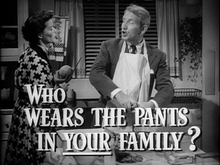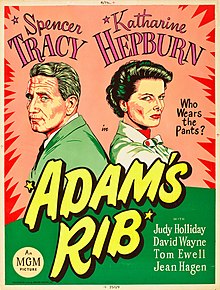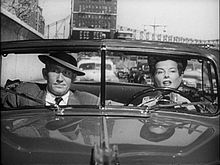Adam's Rib
| Adam's Rib | |
|---|---|
 Theatrical release poster | |
| Directed by | George Cukor |
| Written by | Ruth Gordon Garson Kanin |
| Produced by | Lawrence Weingarten |
| Starring | Spencer Tracy Katharine Hepburn |
| Cinematography | George J. Folsey |
| Edited by | George Boemler |
| Music by | Miklós Rózsa |
Production company | |
| Distributed by | Loew's Inc.[1] |
Release date |
|
Running time | 101 minutes |
| Country | United States |
| Language | English |
| Budget | $1,728,000[2] |
| Box office | $3,947,000[2] |
Adam's Rib is a 1949 American romantic comedy-drama film directed by George Cukor from a screenplay written by Ruth Gordon and Garson Kanin. It stars Spencer Tracy and Katharine Hepburn as married lawyers who come to oppose each other in court. Judy Holliday co-stars as the third lead in her second credited movie role. Also featured are Tom Ewell, David Wayne, and Jean Hagen. The music was composed by Miklós Rózsa, and the song "Farewell, Amanda" was written by Cole Porter.
The film was well received upon its release and is considered a classic romantic comedy. It ranked at No. 22 on the AFI's 100 Years...100 Laughs list. In 1992, this film was selected for preservation in the United States National Film Registry by the Library of Congress as being "culturally, historically, or aesthetically significant."[3][4][5]
Plot
[edit]Doris Attinger follows her husband with a gun in Manhattan one day, suspecting he is having an affair with another woman. In her rage, she fires wildly and blindly around the room and at the couple multiple times. One of the bullets hits her husband in the shoulder. His lover escapes unscathed.
The following morning, the married New York lawyers Adam and Amanda Bonner read about the incident in the newspaper. Adam is an assistant district attorney, while Amanda is a solo-practicing defense attorney. They argue over the case. Amanda sympathizes with the woman, particularly noting the double standard that exists for men and women regarding adultery. Adam thinks Doris is guilty of attempted murder. When Adam arrives at work, he learns that he has been assigned to prosecute the case. When Amanda hears this, she seeks out Doris and becomes her defense lawyer.
Amanda bases her case on the belief that women and men are equal, and that Doris had been forced into the situation by her husband's adultery and emotional and physical abuse. Adam thinks Amanda is showing contempt for the law, since there should never be any excuse for such criminal behavior. Tension increasingly builds at home as the two battle each other in court. The situation comes to a head as Adam feels humiliated during the trial when Amanda encourages one of her witnesses, a woman weightlifter, to lift him overhead. Later at home that evening, Adam still angry, gives Amanda an earful; he doesn't want to be married to a liberated "new woman." Having just packed his bags, he storms out of their apartment. When the verdict is returned, Amanda's plea to the jury to "judge this case as you would if the sexes were reversed" proves successful, and Doris is acquitted.
That night, Adam, who has left their upper-floor apartment, looks through its window and sees the silhouettes of his wife Amanda and their neighbor Kip Lurie, a popular singer, songwriter and piano player who has shown a keen interest in Amanda all along, and repeatedly taunted Adam, as the two of them seem to be dancing and drinking together. Adam breaks into the apartment enraged, pointing a gun at the pair. Amanda is horrified and says to Adam, "You've no right to do this – nobody does!" Adam feels he has proven his point about the injustice of Amanda's line of defense. He puts the gun in his mouth, as Amanda and Kip scream in terror. Then Adam bites a large piece off the gun and chews it. It is made of licorice. Amanda is furious with this prank and a three-way fight ensues.
Now in the midst of a divorce, Adam and Amanda reluctantly reunite for a meeting with their tax accountant. Going through their expenses for the year, they talk about their relationship in the past tense. They talk about the farm they own and recall burning the mortgage. Tears begin to roll down Adam's cheeks. Astonished and touched, Amanda gently bundles her sobbing husband out of the office and to the farm. That night, Adam announces that he has been selected as the Republican nominee for County Court Judge. Amanda jokes about running for the post as the Democratic candidate. Adam says it would make him cry and demonstrates how easily he can turn on the tears, remarking that men can use crocodile tears to manipulate people too. Amanda says there really isn't any difference between the sexes as Adam jumps in bed and closes the curtains, exclaiming otherwise.
Cast
[edit]
|
|
Production
[edit]
The screenplay was written specifically as a Tracy-Hepburn vehicle (their sixth film together) by Garson Kanin and actress Ruth Gordon, married script writers who were friends of the couple. Kanin claimed that Judy Holliday initially declined her role because her character is called "fatso" in the script.[6] According to Kanin, the story of Adam's Rib was based on the lives of Gordon's friends Dorothy and William Dwight Whitney, and of actor Raymond Massey.[6] The Whitneys were married lawyers who represented opposing sides in Massey's high-profile divorce from actress Adrienne Allen before pursuing their own divorce in order to marry their clients from the Massey case.[7] Kanin and Gordon saw great potential in the idea of married lawyers as adversaries, and the plot for Adam's Rib was developed. Other titles for the film were Love is Legal and Man and Wife.[6] The MGM front office quickly vetoed the latter as dangerously indiscreet.[8]
Kanin also recalled that Cole Porter refused to write a song for Madelaine, as Hepburn's character was originally named, but proceeded when the character's name was changed to Amanda. The change allowed Porter to quickly revise a tune he had written during his 1940 adventure in the South Pacific and later discarded as mediocre — "So Long, Samoa."[9] In June 1949, Hollywood Reporter wrote that Porter and MGM agreed to donate all profits from the song, rechristened "Farewell, Amanda," to the Runyon Cancer Fund.
Although set in New York, Adam's Rib was filmed mainly on MGM's stages in Culver City, California.[10] However, location shooting occurred in various parts of New York City, including at the Women's House of Detention where Doris Attinger is imprisoned after shooting her husband, and at Gordon and Kanin's farm in Connecticut.[6]
Hepburn and Kanin encouraged Judy Holliday to play the role of Doris, and Columbia Pictures president Harry Cohn considered her performance a screen test for the lead role in the planned film adaptation of Kanin's play Born Yesterday, in which Holliday had starred during its Broadway run. Receiving positive notices for Adam's Rib, Holliday was cast in the Born Yesterday film, for which she won the Academy Award for Best Actress.[6]
Reception
[edit]
According to MGM records, the film earned $2,971,000 in the US and Canada and $976,000 elsewhere, resulting in a profit of $826,000.[2][11]
Variety staff reviewing the film on December 31, 1949, praised the "...bright comedy success, belting over a succession of sophisticated laughs...This is the sixth Metro teaming of Tracy and Hepburn, and their approach to marital relations around their own hearth is delightfully saucy. A better realization on type than Holliday's portrayal of a dumb Brooklyn femme doesn't seem possible."[12]
On review aggregator website Rotten Tomatoes, Adam's Rib has a "Fresh" score of 96% based on 28 reviews, with an average rating of 8.04/10; the consensus for the film says: "Matched by Garson Kanin's witty, sophisticated screenplay, George Cukor, Spencer Tracy, and Katherine [sic] Hepburn are all in top form in the classic comedy Adam's Rib."[13]
Leonard Maltin gives the film four out of four stars, describing it as "[o]ne of Hollywood's greatest comedies about the battle of the sexes, with peerless Tracy and Hepburn supported by movie newcomers Holliday, Ewell, Hagen, and Wayne."[14]
Awards and honors
[edit]Ruth Gordon (later of Rosemary's Baby and Harold and Maude fame) and Garson Kanin were nominated for the Academy Award for Best Story and Screenplay in 1951.
The film is recognized by American Film Institute in these lists:
- 2000: AFI's 100 Years...100 Laughs – #22[15]
- 2008: AFI's 10 Top 10:
- #7 Romantic Comedy Film[16]
AFI has also honored the film's stars, naming Katharine Hepburn the greatest American screen legend among females and Spencer Tracy #9 among males.
TV adaptation
[edit]Adam's Rib was adapted as a television sitcom in 1973 with Ken Howard and Blythe Danner. The series was canceled after 13 episodes.
References
[edit]- ^ Adam's Rib at the AFI Catalog of Feature Films
- ^ a b c The Eddie Mannix Ledger, Los Angeles: Margaret Herrick Library, Center for Motion Picture Study.
- ^ "National Film Registry" Archived April 19, 2012, at the Wayback Machine. Library of Congress, accessed October 28, 2011.
- ^ Marx, Andy; Wharton, Dennis (December 4, 1992). "Diverse pix mix picked". Variety. Retrieved September 10, 2020.
- ^ "Complete National Film Registry Listing". Library of Congress. Retrieved September 10, 2020.
- ^ a b c d e "Adam's Rib (1949) - Notes - TCM.com". Turner Classic Movies. Retrieved April 29, 2022.
- ^ Pace, Eric (September 20, 1993). "Adrianne Allen, 86, A British Specialist In Light Comedies". The New York Times. ISSN 0362-4331. Retrieved January 27, 2020.
- ^ Kanin, Garson (1971). Tracy and Hepburn: An Intimate Memoir. New York: Viking. pp. 154–155. ISBN 0-670-72293-6.
- ^ "Cole Porter / Miscellaneous Songs". www.sondheimguide.com. Retrieved April 26, 2024.
- ^ The Worldwide Guide to Movie Locations by Tony Reeves. The Titan Publishing Group. p. 12 Archived June 25, 2015, at the Wayback Machine
- ^ "Top Grossers of 1949". Variety. January 4, 1950. p. 59.
- ^ "Adam's Rib". Variety. January 1, 1950. Retrieved January 27, 2020.
- ^ "Adam's Rib (1949) - Rotten Tomatoes". Retrieved May 29, 2017.
- ^ Leonard Maltin (September 2, 2014). Leonard Maltin's 2015 Movie Guide. Penguin. ISBN 9780698183612.
- ^ "AFI's 100 Years...100 Laughs" (PDF). American Film Institute. Retrieved July 17, 2016.
- ^ "AFI's 10 Top 10: Top 10 Romantic Comedy". American Film Institute. Retrieved July 17, 2016.
External links
[edit]- Adam's Rib on TCM.com
- Adam's Rib on the American Film Institute Catalog
- Adam's Rib at IMDb
- Adam's Rib at Rotten Tomatoes
- Adam's Rib essay by Daniel Eagan in America's Film Legacy: The Authoritative Guide to the Landmark Movies in the National Film Registry A&C Black, 2010 ISBN 0826429777, pages 429-430
- 1949 films
- 1949 comedy-drama films
- 1949 romantic comedy films
- 1940s feminist films
- 1940s legal films
- American black-and-white films
- American courtroom films
- American feminist comedy films
- American romantic comedy films
- American romantic comedy-drama films
- Comedy of remarriage films
- 1940s English-language films
- Films about lawyers
- Films adapted into television shows
- Films scored by Miklós Rózsa
- Films directed by George Cukor
- Films set in New York City
- Films shot in Los Angeles
- Metro-Goldwyn-Mayer films
- United States National Film Registry films
- 1940s American films
- Films with screenplays by Garson Kanin
- Films with screenplays by Ruth Gordon
- Cross-dressing in American films
- English-language romantic comedy-drama films

